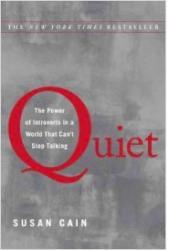While it’s taken me a long time to finally get around to reading this book, most of what Quiet presented was what I had already known by living my life as an introvert. I will applaud this book’s ability to help society realize how ubiquitous the introverts that comprise the population are. Quiet also helps show what our needs are in this world that prizes the traits of extroversion over anything else. Even if there are many times where I have to put on my “extrovert suit,” it helps to know that there’s nothing wrong with being an introvert.
Perhaps my only qualm with this book is how anecdotal the evidence is. Whether it’s stories about famous introverts (which can be inspiring) or younger introverts who are being brought up by parents who don’t quite understand the strengths of the introvert type, Quiet uses a lot of case studies to show how out of place introverts are, especially in the United States. I understand it can be challenging to study a personality type that’s so broad, but a few more references to scientific studies would have been helpful.
What struck me in Quiet was the background it provided on why society evolved to value the extroverts and deem the introverts as “problems.” I still see the effects of this emphasis today. Sure, I put up with being an introvert in an extrovert’s world, and I have made adaptations in my life to survive and thrive in it. I can empathize with the introverts who cannot cope, though, and hopefully, this book can continue to help introverts claim this personality type and own it as I have over the years. Even if we’re different from the perceived norm, we still provide value to a world that insists that louder is better.
A great anthem for those introverts who feel out of place in a gregarious society, I give Quiet 4.0 stars out of 5.
